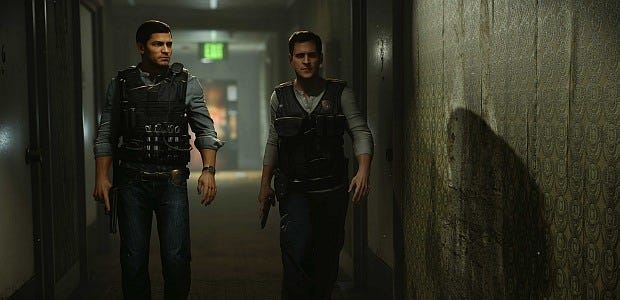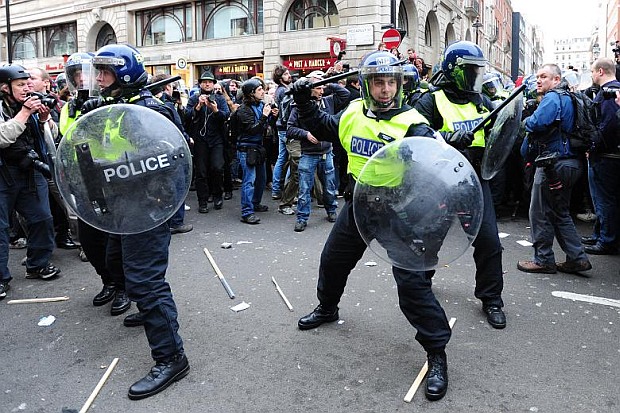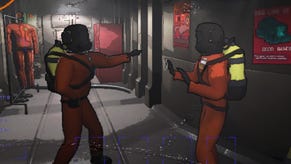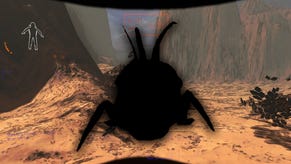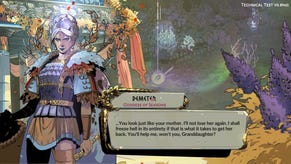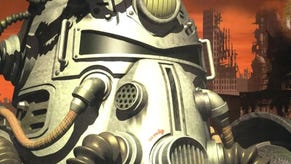A Policeman On What Police Games Get Wrong
"Everybody's somebody's son"
If you played Ryse: Son of Rome you may remember it for the serviceably clangy combat. My friend “Jack”, a police officer from northern England of several years standing, recalls the game for other reasons. “There are those bits where you join a shield wall - you're in a tortoise formation. There are public order situations that are like that. Most officers in Yorkshire get riot training, because of the riots in Bradford. And that sense in Ryse of having all your colleagues alongside, you're all behind your shields, getting pelted with stuff, there are flames going off everywhere and you've got your enemies in front of you... That's real! That happens.”
City riots are, he adds, scenarios that could be “great” in a third-person action game - our wide-ranging conversation is rife with jarring transitions of this sort, where talk of broken bones and drug dealing flips over abruptly into talk of reward mechanics and hardware specs. “Certainly with the advances in technology, the latest consoles and PCs could cope very easily with the amount of animation required, the particle stuff like smoke, all the crap that comes up off the floor, people getting hurt all around you. It's like that and it's scary.”
I’m speaking to Jack over the phone on a sweltering afternoon in London - city of 50,000 police officers, where you seldom go two minutes without hearing the wail of a siren. We’re discussing what designers of police-themed games could do better, inspired by the release of Visceral’s controversial and theoretically “non-military” shooter, Battlefield: Hardline. I wrote the game up for Official Xbox Magazine in March and I’m not sure I really did it justice. Lulled by the innocuous Netflix copshow stylings, my review skimmed the politics of a game that depicts crime-fighting as a literal war between evenly matched armies, in which players are at liberty to gun down suspects on sight. This, in an age of skyrocketing SWAT team deployments and midnight raids, when US enforcers are rolling up to protest marches in armoured personnel carriers, wielding automatic weapons.
Drawing comparisons between Jack’s work and US policing is, of course, a little contentious. Ordinary British police officers don’t carry guns, for starters, and supposedly “police by consent”, which obliges them to seek “the willing co-operation of the public in the task of securing observance of laws” rather than resorting to physical coercion. But there’s comparable tension between UK coppers and those they serve - according to an Independent report, some 3,000 currently active officers were being investigated for assault as of May this year, and London’s Metropolitan Police continues to be plagued by claims of institutional racism.
The problem, Jack suggests, is partly that police are too insular - given to a “siege” mentality when subjected to what they consider to be hopelessly naive public scrutiny. “Everyone's desperate to tell you what policing's all about, but police themselves know that it's actually far seedier,” he says. “We see the very worst things in life, we see all the most horrific, godawful things that happen to people. We see everybody's worst day of their life on every day of our week. So what happens is this culture develops among police of: 'we know what it's really like - the public don't'. And I think it's so important to get over that.”
In the course of an hour’s chat, we discuss how games might bridge the divide, exploring not just the procedures but the strains, compromises and occasional surreality of policework. Jack invokes the scriptwriter’s cliche that crime-fighting is itself a game, a gigantic, shadowy bout of cat-and-mouse - it transpires that this contains more than a grain of truth. “The very top officers - every morning they get round a table, and they have a projector on the wall, and they put dots on the map of the areas they have to cover,” he explains. “And they say: ‘these are the types of crime that have happened in these locations’. And they look at where there are most dots and say 'right, we'll put all of our resources there today'. That's how they do it. It's reactive. Genuinely, it’s like a game to them.
“Where can we allocate resources to reasonably try to prevent crime? Simulation-wise, something like that would be easy [to represent]. You could have offenders with different MOs, crime types, you could set up loads of people who are low-level drug dealers or burglars, who are going around doing specific kinds of theft. You could have an overview of everything without getting into specifics. That's real-life policing. You wouldn't need to go that far-fetched to make it into something playable.”
It can feel like a game at ground level, too. At times, even, a farce. “I caught a burglar on a golf course, would you believe,” Jack recalls. “I ended up chasing him and I caught him on the ninth hole.” Two golfers - “they must have been bankers, because it was Monday afternoon and they were out putting” - happened to witness the arrest, and applauded as he dragged the man back to his car. “And you know, [the burglar] said: 'Ah well, I lost this time. Another time I'd have beaten you.’ And, seven years in, I said: 'Yeah, you probably would have done, but I got the drop on you this time, didn't I?'
“All of these lads, you get to know them. The criminals become known to you. And they're certainly not your friends, but there's a very clear understanding that this is the game. You're a robber, I'm a cop, there is a big game. And sometimes it's just like on the playground. It really is. Honestly, sometimes it is just running and tackling people, other times you have to be a bit cleverer. But that's difficult to depict in games. How do you do it without it becoming just a hackneyed Assassin's Creed chase sequence or capture-the-flag? It's not simple.”
Jack’s outlook is coloured by the games he has played - from a teenage “obsession” with the top-down SWAT series through Rainbow Six’s hostage rescues to the environmental riddles of Assassin’s Creed and Arkham Asylum. He’s also a fan of LucasArts. “I think about a year ago, I came out of a house after dealing with a particularly troublesome criminal, who we knew had done something, realistically, but we couldn’t pin it on him. And I ended up having a sort of verbal joust with him - did you ever play Monkey Island? You know where you have to use those phrases, you have to match the riposte to an insult. It sort of became a little like that.
“So I was thinking, if I was going to make a cop game… [Tone] is a massive thing. You can be heavy-handed, you can be jocular, you can be neutral. How you are with them affects the overall result. But could you transfer that into a game, or would it end up being a sort of glorified Monkey Island rip-off? ‘I am rubber and you are glue’, and all that sort of business.”
Jack is particularly enthused about L.A. Noire, Team Bondi’s 1940s-set whodunnit, with its murder scenes that are steeped in case history and its visionary if goofy handling of body language during interrogations. “I know for a fact that a lot of my colleagues at work loved that game as well, because it was all the best bits of what we actually do, without all the boring paperwork.” The game’s weakness, he suggests, is a familiar one where games in general are concerned: there’s only ever one way of solving a particular problem, so cracking a riddle is often a question of second-guessing the script. “There was one killer, one arsonist or whatever, and if you didn't get the right answer, if you got the wrong bad guy, you got a low rating no matter how well you'd thought it through, no matter the order in which you did things.”
“The cynicism that I've developed kind of tainted what I did in the game, so I was double-checking, triple-checking, or cross-verifying things that you'd perhaps take for granted. So maybe an AI-driven game, where there's no set answer... It would score you on how thorough you were, or on how instinctive you were, or how you followed one lead all the way and then went back to the other one, or whether you dealt with the time-dependent things first. That'd be really fascinating - that would really test your might.”
We speak at length about the valorised concept of moral choice in games - among other things, Jack admits to “agonising” over the decision you make at the end of Far Cry 3. Real-life ethical dilemmas in policing are, as you’d expect, rather trickier and much less glamorous. “My mum always fears for my soul,” says Jack. “She's a religious woman and she thinks that my soul is in jeopardy, because I'm repeatedly presented with - not even ‘moral dilemmas’, because that sort of gives you the idea of a good and a bad choice, doesn't it? Just infinite shades of grey.
You stop a car full of lads, they all run off and there's ten grand in the boot. Nobody would ever know that you'd taken it except those lads, and they're not exactly going to tell the police about it. So what do you do with the cash? Noire didn't deal with [those kinds of] choices, really. It didn't deal with things like 'shall we plant evidence on someone to get him in because we know he's done it'. And there is a lot of that in the real world and certainly in serious policing, there's so much out there - you are wading through a soup of immorality. Bradford is a den of iniquity, for example.”
Police games commonly cast the player as a rookie officer, the idea being to suspend disbelief by having you learn about the job alongside your character. But if police games are to be a means of breaking down assumptions about the profession, it may be more productive to cast the player as a veteran - to demonstrate how police officers can become dangerously desensitised after years of service. “If you're called a twat enough you end up becoming a twat, don't you?” Jack comments. “If you're going to call me a twat anyway I might as well be one - what's the point in being good, if you're still calling me a twat? There’s that kind of resignation.”
He tells me a harrowing story about a colleague who was called to investigate a break-in at a nursing home. The officer arrived to find a young man holding a screwdriver to the throat of a 90-year-old woman, demanding that she hand over the money under her bed. “This burglar was extremely well-known, had a list of previous convictions as long as your arm, but had never really been sent away because he'd always managed to wriggle out of it. And what ended up happening was a bit of summary justice. As far as I'm aware - this must have happened about a few years ago - that burglar still isn't eating solids. He's eating through a tube.
“Now of course the copper's report came out and said 'well, this guy was holding a screwdriver to the lady's throat - I entered the room and started speaking to him, he threw her down and attacked me, and I eventually managed to best him but I had to punch him several times with a bookend', I think it was. He ended up doing him several times around the head, punched him in the throat a few times, and his larynx collapsed - he had to have his jaw wired. But what we realistically knew was that this copper had gone in there and snapped, something in him had just snapped. He'd seen this guy holding a screwdriver to the throat of a frail old lady, and thought 'do you know what - that's wrong'.”
One thing Hardline tried to do was reveal how law-abiding people can be driven to commit crimes. It went about this in a fairly tawdry, unimaginative way - the twist in question sees an officer “going rogue” after being set up by corrupt members of his department, a device that’s as old as Hollywood - but the attempt itself was worthwhile, and worth revisiting. After all, nobody is born a criminal. “Everybody's somebody's son - that's something a lot of police officers understand very well,” Jack notes. “This might be a thieving, stabbing, drug-using scumbag, but he's still somebody's son, somewhere. He's still that little baby with no preconceived notions, and is it a bit of a tragedy? It's a massive tragedy. It's awful that it's come to this.
“I think it would be good to show the slip in a game, when people go from non-criminality to criminality. It's something The Wire was excellent at, certainly that season to do with the kids at school who ended up selling dope - they were actually quite sweet kids, weren't they. It happens anyway, it's not going to change the world, but there's something to be said for showing it, and asking: can we avoid it in some way?”
As our chat winds down I’m left with a deflating sense of just how far there is to go, for all the work that has already been done. Designers have long been alive to the intricacies of CSI and interrogations, the thrill of the chase, the zip and whine of cop jargon, the spectacle of breach-and-clear. There are innumerable police-themed adventure games, joined nowadays by forensically-minded “walking simulators” such as The Vanishing of Ethan Carter. Even open worlders like The Witcher 3 are getting in on the action, however superficially. But there’s a chronic scarcity of games that dig into the psychology of the profession - the brutalisation of both officers and suspects; how it feels to work within a community of known offenders over a period of years; the burdens of circumstance that move people to commit crimes and, most pressingly of all, the possibility of rehabilitation.
“Police work is all about dealing with people,” Jack tells me. “It’s the person you work with and what they bring to the situation. It’s all about the “customers”, as we call them, but also the law-abiding people, getting the best information out of them.” We need more games that treat it as such, rather than as grounds for yet another firefight.
